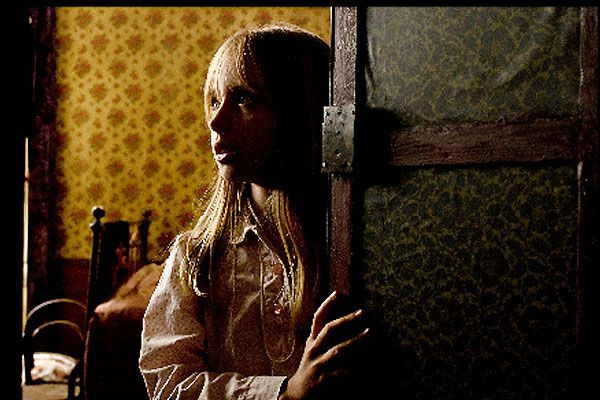The phenomenon of “Sarah’s Key” as book club darling and thrilling feature film illustrates: 65 years since liberation, the Holocaust still fascinates, perplexes, and vexes. Whatever anyone may say to the contrary: this subject is not going away.
At breakfast at the Crosby Street Hotel last week, novelist Tatiana de Rosnay, director Gilles Paquet-Brenner, actor Charlotte Poutrel, and publisher Heloise D’Ormesson discussed the impact of the Holocaust on the making of “Sarah’s Key.”
Keeping close to historic detail, “Sarah’s Key” is the story of a ten year old Jewish girl, arrested with her family by the French police in the Vel’ D’Hiv roundup of July 16, 1942.
Thinking she can save him, young Sarah (Melusine Mayance) locks her little brother in a secret cupboard, promising to return. She clutches the key even in the most horrific circumstance, ripped away from her mother at Beaune-la-Rolande, and awaiting transfer to the death camps.
Interwoven with this WWII drama is the present-day story of Julia Jarmond (Kristen Scott Thomas), an American journalist living in Paris, researching this history for a magazine article. An apartment she and her architect husband are renovating connects the two stories.
Tatiana: All of my books are about apartments. I am obsessed with that. Whenever I am thinking about renting something my husband asks,
what is the rent? I ask, what happened here? Did somebody die here? Realtors are not surprised at these questions. Places, houses, even
streets can harbor memories. I had written about a serial killer who had murdered a Holocaust survivor’s granddaughter and went to see the
site of the Vel D’Hiv so I could describe it. I saw the annex to the Ministry of the Interior (built in 1969), what you see in the movie.
That ‘s when I started researching the Vel D’Hiv. I wanted to show how some people collaborated and some helped.
Gilles: And how that can be the same person. It seemed like a bad joke considering that it had been used like the super dome post-Katrina. I
remember the people in Katrina. The smell. People didn’t know how to act, what would happen next. I do not want people to judge. You have
no idea what you would have done.
Q: Why did you want to write this book? Touch this history?
Tatiana: I’m French. I am ashamed and horrified about what happened. We had heard about the Vel D’hiver roundup. Nobody knew the amount of
children involved, or the extent of the roundup. We were not taught about it in school. Now my children are.
Q: Do the events touch you personally?
Gilles: I am not Jewish. I am an atheist. My grandfather died in Maidanek. He was denounced by neighbors as a German and a Jew. Even my
mother didn’t like to talk about it. She was 2 when he died. My grandmother said he had a ring with poison, a detail I used in film.
Q: Take us through the stages of how the film was made.
Gilles: French Premiere Magazine ran a column: the book we could see as a movie. I read about Tatiana’s book and said, that sounds good. I
bought the book and read half way through and knew I wanted to adapt it. I googled Tatiana and ended up seeing that she knows the writer
Serge Joncour. I had just finished a script based on one of his books. Serge called Tatiana and I met her.
Q: Tatiana, are you happy with the movie of your book?
Tatiana: What worried me in the beginning was my book being tampered with or changed. I met Gilles in La Coupole. I walked in seeing this guy who looked 12. What can he know about my book? When we talked he already had imagined so many scenes, like the girls running throughthe field, escaping from the camp.
That said, the movie is extremely faithful to my book. For example, the scene in the car is exactly as it is in my book as I imagined it.
When he says, the little girl came back. And then it cuts to the little girl rushing up the stairs.
A lot of my books are visual. I write them that way. When I wasn’t a successful writer I watched soap operas. I specialized in cliff hangers. I had a hard time becoming a mother and spent a lot of time in hospitals on my back with nothing to do. I studied soap operas andlearned where to cut the story to make the reader come back the next day. The structure was tricky. The two stories start and you don’t know what they have to do with each other until the car scene.
Q: Why should we pay attention to stories set in the Holocaust now?
Gilles: Every generation has its movie. Not to compare but Schindler’s List was 15 years ago. You don’t have to know everything. You have to understand what the Holocaust or any genocide was. We need to know what happened. You follow Julia –you have to know the past to build the future. You don’t have to be Jewish. You have to understand. The film won the audience award at a festival in Japan. Why? Because it is a universal story. You could have this story set in Rwanda.
Q: Sarah’s son, William, does not know he is Jewish. When he finds out he seems to want to deny it. In that role, Aidan Quinn sees the star
on the picture of the girl and says, oh no we’re not. Is that typical?
Gilles: We should have had Mel Gibson in that role!

